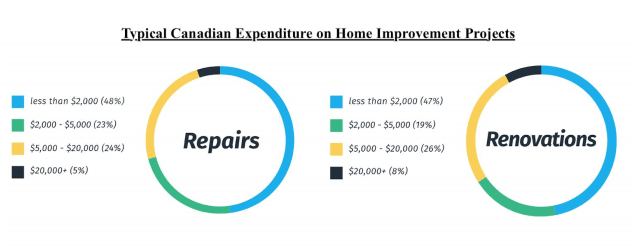Top Home Improvement Solutions and Services in Canada
Pricing varies by product, Discounts on Home + Auto Bundles
Ontario Only
Pricing varies by product
British Columbia, Alberta, Saskatchewan, Manitoba, and Ontario
Pricing varies by product
All of Canada excluding Quebec
Reasons for Home Improvement
People choose to complete home improvement projects for all manner of reasons, such as:
- Increasing home value
- Preparing the home for sale
- Improving the finish of the home or changing its style
- Repairing or replacing older fixtures and finishes
- Fixing structural or age-related issuesÂ
- Improving efficiency to lower utility bills
- Modifying living spaces to accommodate changing needs
Paying for Home Improvement Projects
Minor Repairs
There are two types of home improvement: minor repairs, and major renovations. As you’d expect, the cost of the former is significantly less, and many Canadians use savings to cover the ongoing costs associated with maintaining their home. 57% of homeowners complete one or two minor house repairs every year. The majority spend less than $20,000, and 23% spend less than $5,000 per year on these repair projects.

Major Renovations
Major renovations can become expensive, and as such there are borrowing options to help Canadians afford them. Taking out a home equity line of credit (HELOC) or refinancing your mortgage may be on your radar for funding your home improvement. 54% of all HELOCs are taken to pay for renovations, which isn’t surprising given the possible costs; 8% of homeowners spend more than $20,000 on their major renovation projects.
Types of Home Improvement
Your home has many different elements; some are functional, some structural, and some purely aesthetic - and all are open to change. Let’s take a look at the major areas for home improvement, their costs, and who can help you with each.
Kitchens
The kitchen is one of the most popular rooms to renovate, with 20% of homeowners planning an upgrade in the next year. Updating your kitchen can take several forms:
- Just the aesthetics - painting, new handles for cabinetry, replacing cabinet doors, etc.
- New appliances
- Upgrading cabinets, countertops, and replacing fixtures/fittings
- Complete remodel, including changing the flow and layout of the room
The average kitchen renovation in Canada costs $20,944, or $195 per square foot. There are many kitchen renovation specialists to choose from, but as this is such a popular room to improve, most general contractors and renovation companies will be able to provide kitchen renovation services too.
Bathrooms
Bathrooms are also popular rooms to renovate, and in terms of investment the smartest place to spend your money. Because of the great variety in finishes available, the cost can fluctuate from as little as $7,785 to as much as $19,388 per bathroom, with the average sitting at $13,393.
Common areas for bathroom renovation include:
- Countertops
- Flooring
- Lighting
- Bathtub or shower
- Tiling
- Vanity/sink
- ToiletÂ
- Plumbing
As with kitchens, most general contractors and renovation companies will be able to handle your bathroom project; they are simply too common a request for the market to be handled by bathroom companies alone. However, there are dedicated bathroom fitting companies who may have a greater range of products, and who can handle more niche needs.
Basements
Canada loves its basements, and renovating your basement is one of the best ways to maximize your living space. This can be a relatively simple or a very complex task, depending on its condition when you begin. When looking at a basement reno, consider whether you need any of the following:
- Demolition of existing fixtures/fittings/internal structures
- Repairing foundation cracks
- Waterproofing
- Installing new windows
- Installing new or upgrading existing external doors
- Insulation
- Framing
- Installing new or rerouting HVAC systems
- Flooring
- Internal partitions
- Installation of new plumbing
- Rewiring and installation of new electrical outlets
- Installing or upgrading a bathroom
- Lighting
- Decor
The average cost of a basement reno is $30,000. However, this number can quickly spiral if you want high-end finishes or custom pieces, so it’s best to budget between $25 to $50 per square foot to take account of the range.
As basements present challenges not found elsewhere in the home, there are many dedicated basement renovation providers. These are by far the best people to seek help from if you are worried about foundation issues, waterproofing, drainage, natural light, or any of the other common concerns regarding basement living. While general contractors may be able to help with simpler items, such as flooring, framing, insulation, and so on, they would almost certainly need to subcontract more specialist tasks anyway.
Roofing
Your roof is what keeps your home watertight, so although it may not be an exciting area to renovate, it is a component of your home that must be maintained properly. Roofs are diverse - not only in size, but also in type, style and components. This means that improving your roof can cost anywhere from a few thousand dollars to $20,000+.
The elements that impact the cost of a roof renovation include:
- Roof size
- Roof slope
- Roof condition
- Location
- Materials used
- Garbage disposal options
Roofing companies abound in Canada, and are usually fairly distinct from other renovation and contracting companies. Part of the reason for this is that roofing comes with its own set of safety and weather challenges, and as such the people performing the work need to be properly trained and certified. Sometimes more general contractors may offer basic roofing services, but this certainly won’t be their main area of expertise.
Landscaping
Landscaping work can take years to come to fruition, but as it’s probably the biggest single factor impacting your home’s curb appeal, it’s worth the effort. Landscaping covers everything outside, such as:
- Fencing
- Decks
- Patios
- External structures, including pools and hot tubs
- Trees, plants, shrubs and flowers
- Grading of the plot and earthworks
- Retaining walls
- Lawns
- Water features
- Walkways and entrances
- Ongoing maintenance of lawn and plants
The size of your plot has a big impact both on what’s possible for your home, and how much it will cost. Fences and decks are often thought to be the most expensive aspects of a garden, but in fact they are relatively cheap when compared to structural changes to your land. The average new fence costs $40 per linear foot, and the average deck is $20 per square foot. So a reasonable budget would be $4,000 for new fencing and $7,000 for a new deck (given the average Canadian home size).
As performing and ensuring the quality of outdoor work differs so much from internal work, landscaping specialists are the people to turn to for outdoor improvement projects. A general contractor or renovation company may be able to help you with a simple deck or fence, but the design, planning, planting and care of a whole garden project is best handled by the experts.
Key Functional Elements of the Home
As well as the individual areas listed above, there are some more basic home components to consider when performing renovations:
- HVAC (heating, ventilation and air conditioning)
- Plumbing
- Wiring and electrical panel
- Windows and doors
These are functional elements of the home, running through its walls and powering the systems in every room. Without their proper maintenance and care, your home may become inconvenient or even downright dangerous to live in. And as they are so important, specialists (like electricians and plumbers) exist to perform routine maintenance and safety checks, as well as to make changes and install new systems. Always make sure your contractor has access to the appropriate personnel to complete your home improvement project.
Frequently Asked Questions About Home Renovations
Do I need a permit to do a home renovation?
Structural, electrical and plumbing additions require permits, but cosmetic changes or simple improvements do not. A good contractor will guide you through the permits process, but if you’re going it alone make sure you do your research before starting any work.
How can I be sure I’m getting a fair quote?
It’s always advisable - with any home improvement project - to get several quotes so that you can compare costs and expectations, and to be sure that you are choosing a company you trust. Most people recommend three quotes, though for larger projects you may want to extend to five to be sure you find a company you can work with over the life of the project.
What happens when costs run over?
The typical quote you receive from a renovation company will be a ‘best case scenario’ quote, so the minute your project hits a roadblock or encounters a delay, costs will escalate. Because of this, you should always have on hand a contingency fund to deal with overruns - most experts recommend a minimum of 20% of the cost of the project. The only exception to this is if you have a fixed price contract, so that the burden of any overspend falls on the construction company and not you. This is fairly unusual with residential projects though.
Is there a better time of year to renovate?
Both your location and your project type can impact when to start home improvement work. More temperate areas, like southern B.C., allow for both indoor and outdoor projects year-round. However, in colder zones - especially those expecting large snowfalls - outdoor projects are much harder to complete in the winter. If you’re considering work outdoors, plan for an autumn completion date, for safety.
Do home renovations come with a warranty?
The contractor you use for your project dictates whether or not their work comes with a warranty - and how long that warranty lasts. Most companies offer a 12 month guarantee on their work, but every company is different and there are no legal requirements that a warranty be provided. A reputable company will automatically offer a written warranty; do not accept verbal assurances, as these are not enforceable.
Written By Smarter Loans Staff

The Smarter Loans Staff is made up of writers, researchers, journalists, business leaders and industry experts who carefully research, analyze and produce Canada's highest quality content when it comes to money matters, on behalf of Smarter Loans. While we cannot possibly name every person involved in the process, we collectively credit them as Smarter Loans Writing Staff. Our work has been featured in the Toronto Star, National Post and many other publications. Today, Smarter Loans is recognized in Canada as the go-to destination for financial education, and was named the "GPS of Fintech Lending" by the Toronto Star.
Discover Popular Financial Services
Why Choose Smarter Loans?

Access to Over 50 Lenders in One Place

Transparency in Rates & Terms

100% Free to Use

Apply Once & Get Multiple Offers

Save Time & Money

Expert Tips and Advice














